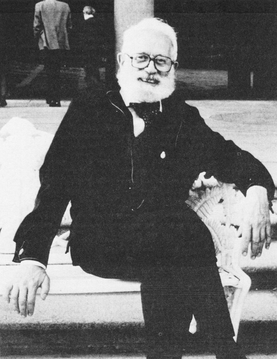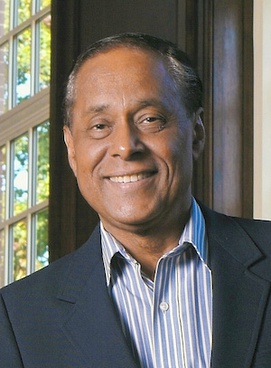The Fulbright Program, including the Fulbright–Hays Program, is one of several United States Cultural Exchange Programs with the goal of improving intercultural relations, cultural diplomacy, and intercultural competence between the people of the United States and other countries through the exchange of persons, knowledge, and skills. Via the program, competitively-selected American citizens including students, scholars, teachers, professionals, scientists, and artists may receive scholarships or grants to study, conduct research, teach, or exercise their talents abroad; and citizens of other countries may qualify to do the same in the United States.
Jewish studies is an academic discipline centered on the study of Jews and Judaism. Jewish studies is interdisciplinary and combines aspects of history, Middle Eastern studies, Asian studies, Oriental studies, religious studies, archeology, sociology, languages, political science, area studies, women's studies, and ethnic studies. Jewish studies as a distinct field is mainly present at colleges and universities in North America.
The American Council of Learned Societies (ACLS) is a private, nonprofit federation of 75 scholarly organizations in the humanities and related social sciences founded in 1919. It is best known for its fellowship competitions which provide a range of opportunities for scholars in the humanities and related social sciences at all career stages, from graduate students to distinguished professors to independent scholars, working with a number of disciplines and methodologies in the U.S. and abroad.

Indian Statistical Institute (ISI) is a public university which is recognized as an Institute of National Importance by the 1959 act of the Indian parliament. It grew out of the Statistical Laboratory set up by Prasanta Chandra Mahalanobis in Presidency College, Kolkata. Established in 1931, this unique institution of India is one of the oldest institutions focused on statistics, and its early reputation led it to being adopted as a model for the first US institute of statistics set up at the Research Triangle, North Carolina by Gertrude Mary Cox.

Sankar Kumar Pal is a computer scientist and the President of the Indian Statistical Institute (ISI), Kolkata. He is also a National Science Chair, Government of India. Prof. Pal is a computer scientist with an international reputation on pattern recognition, image processing, fuzzy neural network, rough fuzzy hybridization, soft computing, granular mining, and machine intelligence. He pioneered the development of fuzzy set theory, and neuro-fuzzy and rough-fuzzy computing for uncertainty modelling with demonstration in pattern recognition, image processing, machine learning, knowledge-based systems and data mining. Prof. Pal is widely recognized across the world for his pioneering and extraordinary contributions in Machine Intelligence, Fuzzy Logic, Soft Computing and Pattern Recognition. This has made India a leader in these disciplines in international scenario. He founded the Machine Intelligence Unit in 1993, and the Center for Soft Computing Research: A National Facility in 2004, both at the ISI. In the process he has created many renowned scientists out of his doctoral students.

Punjabi University is a collegiate state public university located in Patiala, Punjab, India. It was established on 30 April 1962 and is only the second university in the world to be named after a language, after Hebrew University of Israel. Originally it was conceived as a unitary multi-faculty teaching and research university, primarily meant for the development and enrichment of the Punjabi language and culture, but alive to the social and education requirements of the state.

The Harvard–Yenching Institute is an independent foundation dedicated to advancing higher education in Asia in the humanities and social sciences, with special attention to the study of Asian culture. It traditionally had close ties to Harvard University and the now-defunct Yenching University, and its offices are located on the Harvard campus in Cambridge, Massachusetts, but it is not part of Harvard.
The Institute for Social and Economic Research and Policy (ISERP) is the research arm of the social sciences at Columbia University, formerly known as the Paul F. Lazarsfeld Center for the Social Sciences. ISERP works to produce pioneering social science research and to shape public policy by integrating knowledge and methods across the social scientific disciplines. ISERP organizes an active intellectual community at Columbia University through its Faculty Fellows program, research centers, projects, and training initiatives.
Purushottama Bilimoria is an Australian-American philosopher and Professor at O.P. Jindal Global University.

The Institute of International Education (IIE) is an American 501(c) non-profit organization that focuses on international student exchange and aid, foreign affairs, and international peace and security. IIE creates programs of study and training for students, educators, and professionals from various sectors. The organization says its mission is to "build more peaceful and equitable societies by advancing scholarship, building economies, and promoting access to opportunity".

Ernest Bender was a Professor of Indo-Aryan languages and literature at the University of Pennsylvania.
National Translation Mission (NTM) is a Government of India initiative to make knowledge texts accessible, in all 22 official languages of the Indian Republic listed in the VIII schedule of the Constitution, through translation. NTM was set up on the recommendation of the National Knowledge Commission. The Ministry of Human Resource Development has designated Central Institute of Indian Languages as the nodal organization for the operationalization of NTM.
Granville Seward Austin was an American historian of the Indian Constitution.

The Center for Khmer Studies is an independent American Overseas Research Center working to promote research, teaching and public service in the social sciences, arts and humanities, as they are related to Cambodia and the Mekong region. CKS also aims to connect Cambodian scholars, students and artists with their international colleagues for the purposes of fostering understanding of Cambodia and Southeast Asia.
The Chiang Ching-kuo Foundation for International Scholarly Exchange is a private nonprofit organization located in Taipei, Taiwan, that provides support for research grants on Chinese studies in the humanities and social sciences at overseas institutions. It was founded in 1989 and named after Chiang Ching-kuo, the late President of the Republic of China from 1972 to 1988. The foundation also has a regional office in McLean, Virginia in the United States.
Mohammad Jahangeer Warsi is an Indian linguist, researcher, and author. He is known for his background and expertise in South Asian Languages and Linguistics. He is a member of the faculty at Washington University in St. Louis, where he serves as a lecturer in the Department of Jewish, Islamic, and Near Eastern Languages and Cultures. He is a native of Darbhanga district, Bihar, in India.
The University of Pennsylvania Libraries have one of the most important and largest collections of research material pertaining to the study of South Asia in the United States of America. Starting with the nineteenth century, when Sanskrit was first taught at the University of Pennsylvania, the Libraries have collected material for the study of South Asia.
The College of Education is one of 15 colleges at The Pennsylvania State University, located in University Park, Pennsylvania. It houses the departments of Curriculum and Instruction, Education Policy Studies, Learning and Performance Systems, and Educational Psychology, Counseling, and Special Education. Almost 2,300 undergraduate students, and nearly 1,000 graduate students are enrolled in its 7 undergraduate and 16 graduate degree programs. The college is housed in four buildings: Chambers, Rackley, Keller, and CEDAR Buildings.
Annu Palakunnathu Matthew is a British photographer. Her work has been exhibited at the Rhode Island School of Design Museum; Harvard Art Museums; Guangzhou Biennial of Photography, China; Tang Museum, New York; and The Smithsonian National Museum of Natural History. Matthew is a professor of art (photography) in the University of Rhode Island's Department of Art and Art History.

Roger Norman Buckley was an American academic who served as Professor of History and founding director of the Asian American Studies Institute at the University of Connecticut. He authored many scholarly monographs and journal articles, along with several novels.









